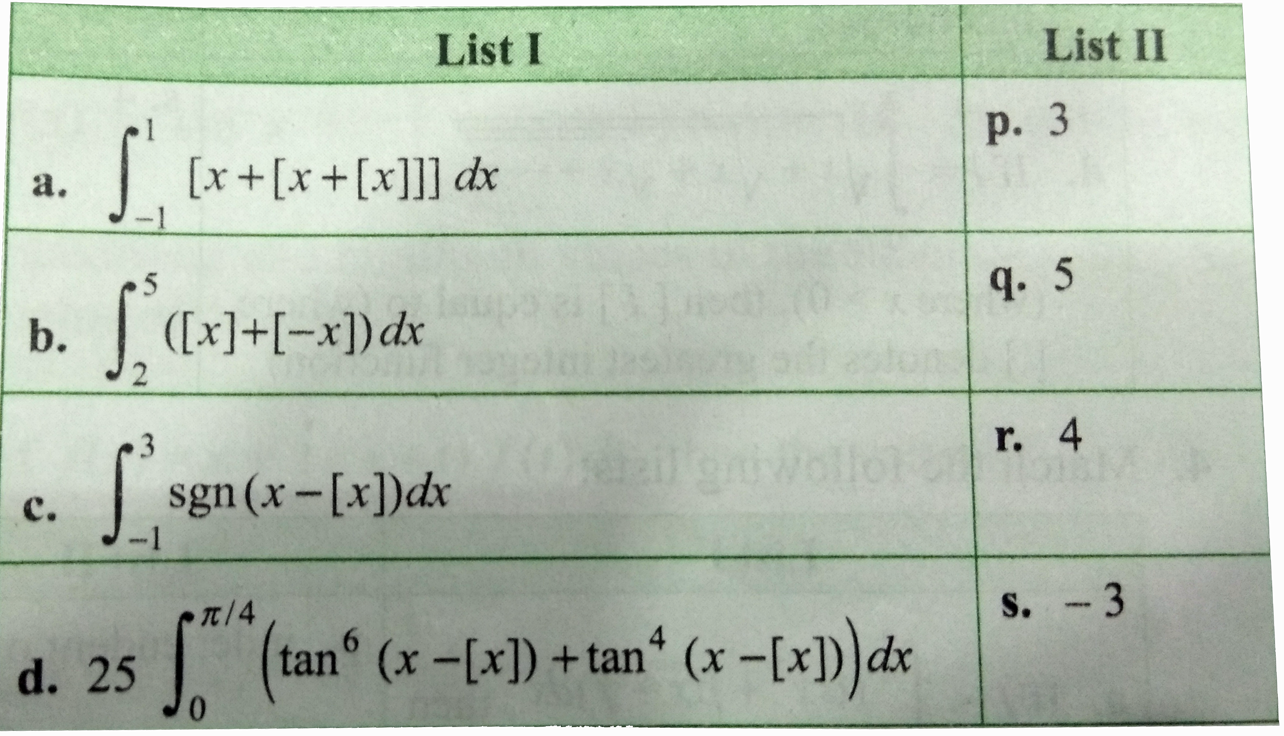If where is positive integer or zero, then show that Hence, deduce that Solution in Bengali
The correct Answer is:C
.................1
.............2
From 1 and 2 we get
are in A.P.
(common difference)
Now,
Topper's Solved these Questions
- DEFINITE INTEGRATION Book:CENGAGE PUBLICATIONChapter:DEFINITE INTEGRATION Exercise:MATRIX MATCH_TYPE
Explore 6 Videos
- DEFINITE INTEGRATION Book:CENGAGE PUBLICATIONChapter:DEFINITE INTEGRATION Exercise:NUMERICAL VALUE_TYPE
Explore 28 Videos
- DEFINITE INTEGRATION Book:CENGAGE PUBLICATIONChapter:DEFINITE INTEGRATION Exercise:MCQ_TYPE
Explore 27 Videos
- CURVE TRACINGBook:CENGAGE PUBLICATIONChapter:CURVE TRACINGExercise:EXERCISES
Explore 24 Videos
- DETERMINANTBook:CENGAGE PUBLICATIONChapter:DETERMINANTExercise:Multiple Correct Answer
Explore 5 Videos
Similar Questions
If [.] denotes the greatest integer function, then match the following lists:

View SolutionIf the value of (lim)n→∞(n−32).∑6nj=1√j is equal to √N then the value of N8 is __________
View SolutionIf f(x) is integrable over [1,2], then ∫21f(x)dx is equal to
(a) (lim)n→∞1nn∑r=1f(rn) (b) (lim)n→∞1n2n∑r=n+1f(rn) (c) (lim)n→∞1nn∑r=1f(r+nn) (d) (lim)n→∞1n2n∑r=1f(rn)
View SolutionFind the derivative of y=sin2x−cosx
View SolutionIf x∈R,ai,bi,ci∈R for i=1,2,3 and ∣∣ ∣∣a1+b1xa1x+b1c1a2+b2xa2x+b2c2a3+b3xa3x+b3c3∣∣ ∣∣=0, then which of the following may be true ?
View SolutionIf Un=∫π01−cosnx1−cosxdx, where n is positive integer or zero, then show that Un+2+Un=2Un+1. Hence, deduce that ∫π20sin2nθsin2θ=12nπ.
View SolutionIf n is a positive integer, prove that: ∫2π0cos(n−1)x−cosnx1−cosxdx=2π, hence or otherwise, show that ∫2π0⎛⎜ ⎜⎝sin(nx2)sin(x2)⎞⎟ ⎟⎠2dx=2nπ.
View SolutionIf vn=∫10xntan−1xdx, show that: (n+1)un+(n−1)un−2=π2−1n
View SolutionGiven that un+1=3un−2un−1, and u0=2,u1=3, then prove that un=2n+1 for all positive integer of n
View Solutionun=2cosnθ হলে দেখাও যে, un+1=u1⋅un−un−1,
View SolutionIf Un=∫π01−cosnx1−cosxdx, where n is positive integer or zero, then show that Un+2+Un=2Un+1. Hence, deduce that ∫π20sin2nθsin2θ=12nπ.
View SolutionIf Un=∫10xn(2−x)ndxandVn=∫10xn(1−x)ndx,n∈N, and if VnUn=1024, then the value of n is________
View SolutionFor Un=∫10xn(2−x)ndx;Vn=∫10xn(1−x)ndxn∈N, which of the following statement(s) is/are true? Un=2nVn (b) Un=2−nVn Un=22nVn (d) Vn=2−2nUn
View SolutionIf Un=∫π01−cosnx1−cosxdx where n is positive integer of zero, then
The value of Un is a. π/2 b. π c. nπ/2 d. nπ
View SolutionGiven that un+1=3un−2un−1, and u0=2,u1=3, then prove that un=2n+1 for all positive integer of n
View SolutionIf n is a positive integer, prove that:∫2π0cos(n−1)x−cosnx1−cosxdx=2π, hence or otherwise, show that ∫2π0⎛⎜ ⎜⎝sin(nx2)sin(x2)⎞⎟ ⎟⎠2dx=2nπ.
View Solution

